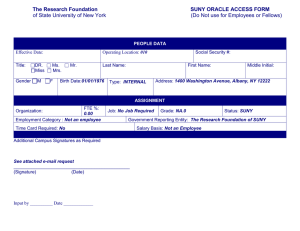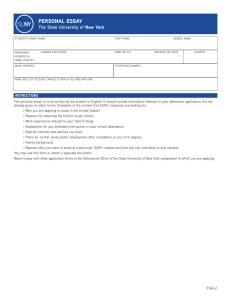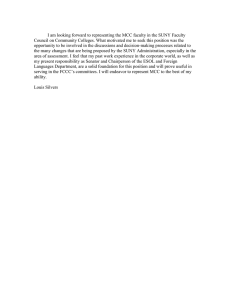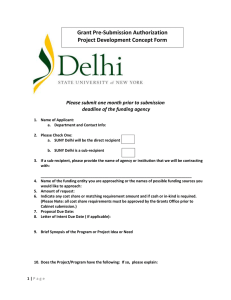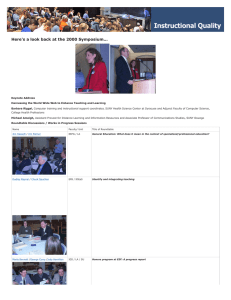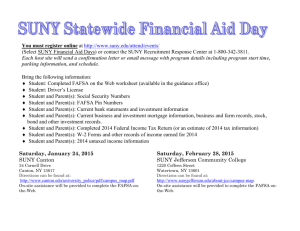Report on the October 2004 Plenary Meeting
advertisement
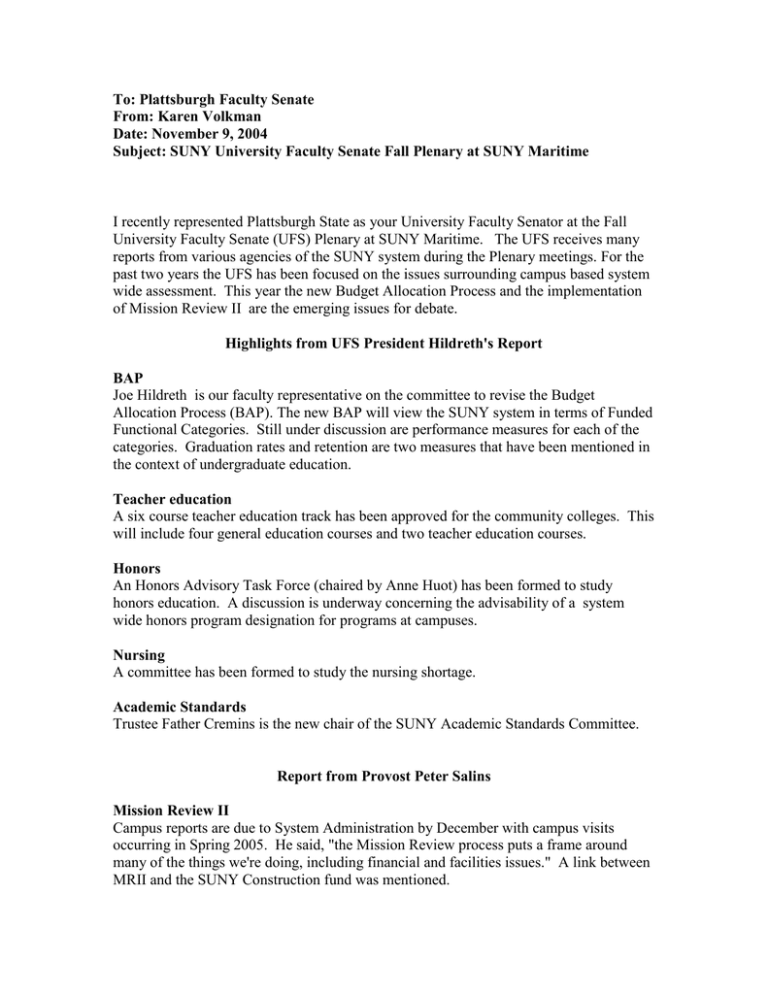
To: Plattsburgh Faculty Senate From: Karen Volkman Date: November 9, 2004 Subject: SUNY University Faculty Senate Fall Plenary at SUNY Maritime I recently represented Plattsburgh State as your University Faculty Senator at the Fall University Faculty Senate (UFS) Plenary at SUNY Maritime. The UFS receives many reports from various agencies of the SUNY system during the Plenary meetings. For the past two years the UFS has been focused on the issues surrounding campus based system wide assessment. This year the new Budget Allocation Process and the implementation of Mission Review II are the emerging issues for debate. Highlights from UFS President Hildreth's Report BAP Joe Hildreth is our faculty representative on the committee to revise the Budget Allocation Process (BAP). The new BAP will view the SUNY system in terms of Funded Functional Categories. Still under discussion are performance measures for each of the categories. Graduation rates and retention are two measures that have been mentioned in the context of undergraduate education. Teacher education A six course teacher education track has been approved for the community colleges. This will include four general education courses and two teacher education courses. Honors An Honors Advisory Task Force (chaired by Anne Huot) has been formed to study honors education. A discussion is underway concerning the advisability of a system wide honors program designation for programs at campuses. Nursing A committee has been formed to study the nursing shortage. Academic Standards Trustee Father Cremins is the new chair of the SUNY Academic Standards Committee. Report from Provost Peter Salins Mission Review II Campus reports are due to System Administration by December with campus visits occurring in Spring 2005. He said, "the Mission Review process puts a frame around many of the things we're doing, including financial and facilities issues." A link between MRII and the SUNY Construction fund was mentioned. Teacher Education Salins commented that SUNY educated almost half the teachers in New York State and lauded the creation of SUTEC (SUNY Urban Teacher Education Center) in New York City. (http://www.suny.edu/sutec/ for more information) The focus of SUTEC is higher needs parts of the state such as large urban areas and the subjects: math, science, special education, and foreign languages. He envisions the higher education community taking the lead in setting the policy/tone for secondary and elementary education and working more on the research and policy components. This is tied to a SUNY initiative to analyze high school preparation for college to counter the notion that "we are starting from scratch in college". SUNY has a pilot program to study high school transcripts. Learning Environments Salins was extremely positive, noting that System Administration has made a significant investment in hiring new employees to support the SLN and CourseSpace. He noted that CourseSpace Lite will be free to all campuses. BAP Salins explained that the new BAP uses Funded Functional Categories to give SUNY a "policy tool". This way SUNY can explain to legislators what the consequences of a reduction in budget would actually mean in terms of eduation. The new BAP will set aside money (probably 2-3%) to reward campuses that meet specific performace measures. The new BAP will be implemented in FY 2006. Chancellor King BAP The Chancellor described the new BAP as "predictable, transparent, fair, and not creating financial expectations that we can't meet". He assured us that the new BAP would give as much support as possible to the undergraduate side of the equation. He also assured us that the essence of retention is having more full-time faculty, not less. Funding The Chancellor also told the UFS that preparations are underway to release more of the $50 million SUNY budget that was impounded. The figure he gave us was another 10 to 11 million will be released. Father Cremmins (replacing Candace de Russy) Father Cremmins, the new Chair of the Academic Standards Committee, was invited to meet the Senators. He spoke briefly about academic integrity not as a witch-hunt, but as a measure of the value of the SUNY degree. The tenor of his comments was extremely positive toward faculty and students. He was warmly received by the University Faculty Senate. The following Resolutions were presented: Governance at the School of Nanotechnology at U. Albany Relations between the Faculty Council of Community Colleges and the University Faculty Senate Selection of Campus Presidents Campus faculty governance participation in the Mission Review II process The text of these resolutions should be available on the University Faculty Senate website later this week. (http://www.suny.edu/FacultySenate/) An extensive discussion was held concerning faculty governance participation in the MR II process. Participation ranged from consultation of faculty governance resources and planning committees to no faculty governance participation at all on some campuses. This issue was brought to the University Faculty Senate by the Campus Governance leaders.
